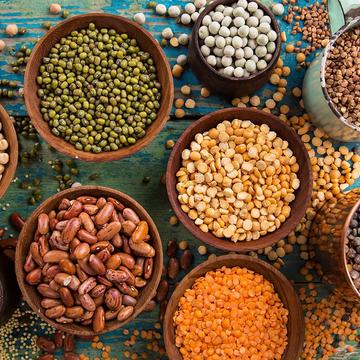The Department of Biology welcome Professor Lars Østergaard from November 2022 as the new Sherardian Professor of Botany. Lars joins the department from the John Innes Centre, Norwich where he studied comparative reproductive tissue development using both crops and non-cultivated plant species as model systems. A principal driver for research in Lars’ laboratory is based on connecting disciplines in the area of developmental biology to understand how morphological diversity evolves.

Legumes are a staple part of many diets worldwide. The five leading types of legumes purchased in the US were pinto bean, black bean, kidney bean, lima bean, and chickpea.
In addition to his fundamental programme, Lars is committed to identifying translational opportunities to improve the yield and production of our most common crops, such as legumes. Legumes are a very important group of plants which include many staple foods such as beans, lentils, peas, and chickpeas. Most plants in this group are grown agriculturally for human consumption of livestock forage, so improving their yields will make a huge impact to global food security.
With his recently initiated programme on legume research, he will exploit his experience with model-to-crop approaches to improve specific traits related to legume pod growth and seed yield. Lars will continue this research now with the Department of Biology in Oxford.
Professor Lars Østergaard said:
“It is a great honour to have been given this opportunity and I am hugely excited to establish my research programme at the new Department of Biology in Oxford. I look forward to building new collaborations across the department.”
The Sherardian Professorship, established in 1734, constitutes a long line of influential biologists working in the field of Botany. Lars takes over the post from Liam Dolan, whose work whilst in post has led to spin outs such as MOA in 2018. Liam’s research into the genetic mechanisms of plant growth, development and herbicide resistance was applied through MOA, and is now helping to tackle herbicide resistance in the food production industry.
Other former post holders include Arthur Tansley, who introduced the concept of ecosystems into biology, Bob Whatley, who contributed greatly to early work on photosynthesis, energy metabolism, and the origin of mitochondria in the serial endosymbiotic theory, and Hugh Dickinson who still contributes to work on epigenetics and cell fate in plant reproductive lineages, even in retirement.
Mark Fricker, Joint Head of the Department of Biology, said:
“We are excited to welcome Lars to Oxford and the Department. His elegant experimental work on fruit development in model plants such as Arabidopsis and Capsella has significantly advanced the molecular understanding of this critical part of the plant life cycle. He has also begun to translate these fundamental discoveries into crop improvement for agronomically relevant members of the Brassicaceae and Fabaceae (legumes) using precision breeding. He is set to play a major role in developing these approaches in Oxford as part of the new Biology Department.”